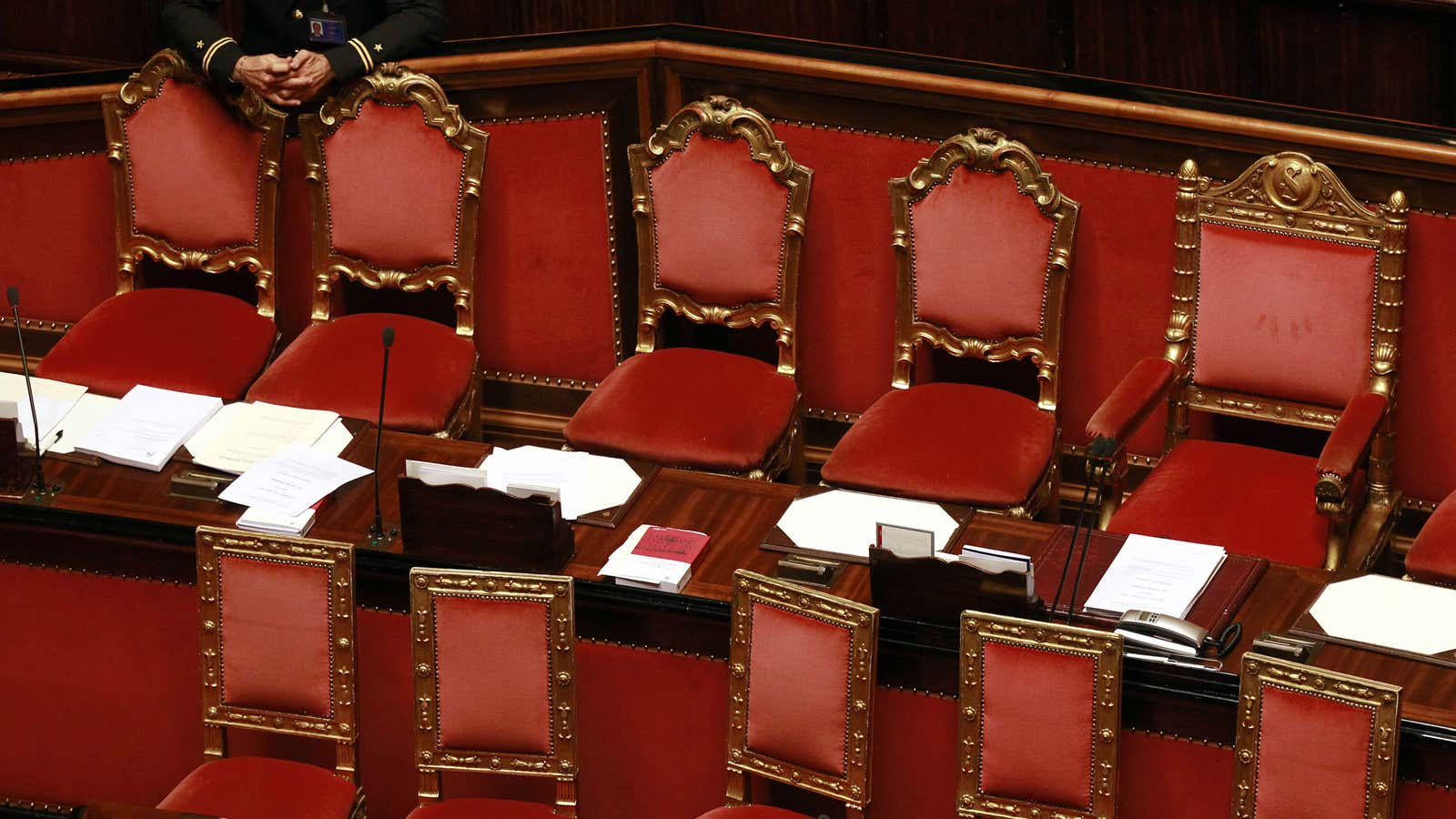On Jan. 13, the last day of the Italian presidency of the European Union, Italy’s prime minister Matteo Renzi talked about the Italian economy in encouraging terms. Renzi said Italians’ finances are better than they think. Italy has the world’s highest personal savings rate, which has continued to grow during the crisis. Renzi, in other words, deemed Italians’ economic fears as exaggerated, saying, ”Italian families are paradoxically getting richer.”
The statement was incredibly tone deaf and generated outrage in a country that is still in a recession, where unemployment has reached unprecedented levels.
It’s precisely missteps like this one that explain why 93% of Italians, in a recent survey by research institute Demos, have declared they do not trust their own parliament. The same survey asked their about trust in other institutions and found that just 15% of Italians trust their banks, slightly more than their unions, which clocked a 14% trust level. Political parties won the distrust sweepstakes, with 97% of Italians expressing skepticism in those organizations.
A republic is made up of institutions—and behind them, people. When the institutions don’t have the citizens’ trust, things are in bad shape. But is the skepticism of the Italian people in their government warranted? Sadly, if the events of last two years is anything to go by, it is. Here, a quick history:
November 2011
After a series of protests in the squares, and after having left the country’s books in terrible shape, prime minister Silvio Berlusconi—involved in a series of trials and scandals—resigned. President of the republic Giorgio Napolitano assigns Mario Monti the task of forming a “technical government” with the goal of tackling the reforms badly needed by the country’s economy.
February to April 2013
At the end of the legislative session, general elections are held. The results—partially due to a controversial new electoral law—create a parliament without a majority party. Pierluigi Bersani, the leader of the center-left Partito Democratico (PD), wins a plurality, and is asked to form a government. Reckoning he won’t get enough support, he rejects the mandate. Enrico Letta, also from PD, forms a coalition government.
April 2013
Approaching the end of Napolitano’s seven-year term, the parliament sets out, according to Italian law, to elect a new president of the republic. A two-thirds majority, plus some regional representatives, are required for a candidate to win. After four ballots, no candidate gets a majority and the parliament re-recruits Napolitano, who previously said he would not accept a second mandate. He accepts.
May 2013
Interviewed about his policy program, prime minister Letta declares that reforming the 2005 electoral law is his top priority: The parliament’s composition makes his an “unideal government” and the country needs a better law before it heads back to the polls.
December 2013
The Constitutional Court concurs with a citizen petition that the electoral law, nicknamed Porcellum (pig), is troublesome, and declares it unconstitutional. Italy’s electoral procedure must be reformed or, in a worst case scenario, the country will have to revert to an outdated set of laws. The ruling implies something of paramount importance in any democracy: if the law under which the government is elected is in itself unconstitutional, the parliament has no constitutional legitimacy to be a ruling authority.
February 2014
After his party withdraws its support from his government, Letta resigns. While many call for elections, the argument is made that the electoral law still hasn’t been reformed. The government must do that before the country heads off to the polls.
Matteo Renzi wins the PD primaries of the Democratic Party with a campaign focused on change and the rejection of large, coalition, government. Renzi ends up forming a large, coalition, government. He promises one reform per month, assuring the voters that by the end of February there will be a reform of the electoral law, as well as other constitutional reforms. Renzi proposes an ambitious program (perhaps over ambitious, judging by the missed commitments thus far) that would run until 2018, but shows no intention of calling elections.
All the country’s main political forces—with the exception of the wild card Five Star Movement—seem comfortable with the idea of an unconstitutional parliament modifying the constitution. The urgent need of reform laws in Italy, which keeps slipping further into recession, trump the democratic requirements of validly electing those who make them.
January 2015
As Renzi spoke about Italians getting rich in Strasbourg, France, President Napolitano resigns. His old age (he turns 90 in June), he says, keeps him from completing his second term with the requisite energy.
The parliament—in the process of voting on electoral as well as constitutional reforms—sets out to vote, once again, for the president of the republic.
It’s this parliament, these parties, Italians don’t trust.
The same parliament, unconstitutionally elected, that failed to agree on a name two years ago. The same parliament, with no constitutional validity, that is reforming the constitution. The same parliament that has promised an electoral law for two years now, and shows no intention of heading to the polls, even after reforms are approved.
Saddest of all, la casta (the caste)—Italy’s version of the 1%— doesn’t even care. Voters who are this disillusioned with their government no longer bother to try and keep it accountable. It’s a vicious circle Italy can’t escape. For all the social media politicking that has marked these past few years, many Italians don’t feel that that real change is coming anytime soon. Too bad, since one of Renzi’s favorite hashtags when promoting his government is #lavoltabuona—the right time. He couldn’t be more wrong.




